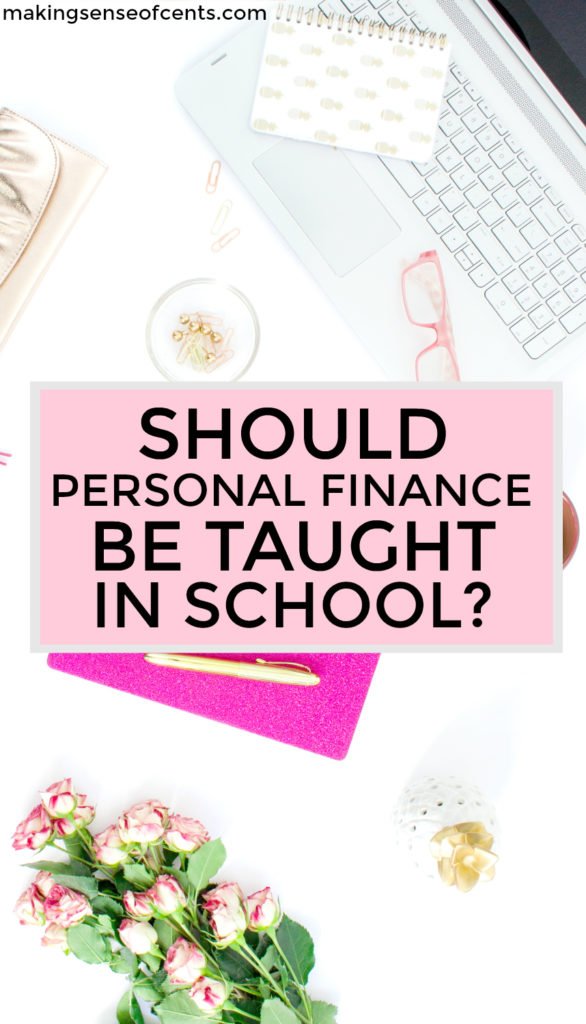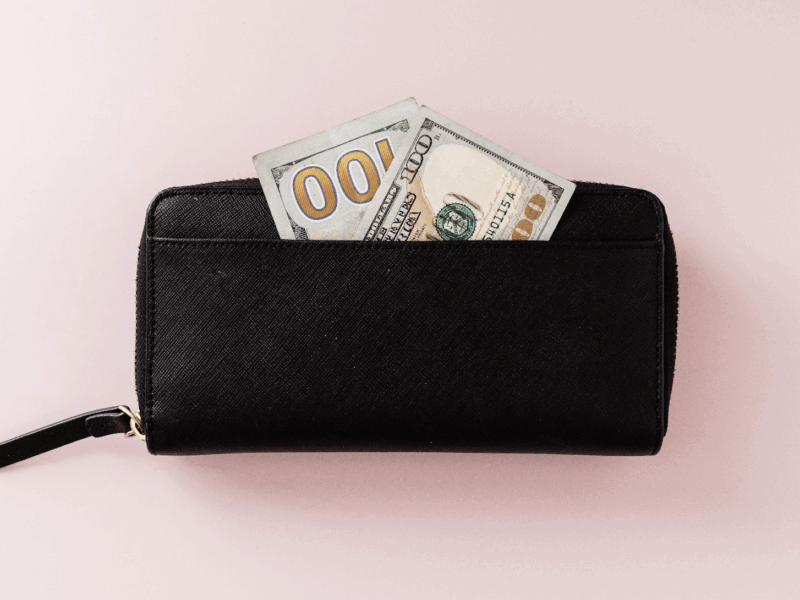 While I can’t guarantee that I would have paid super close attention to a personal finance education class if I had taken it, I’m sure it would have been a better use of my time than some of the other classes that were required when I was in school.
While I can’t guarantee that I would have paid super close attention to a personal finance education class if I had taken it, I’m sure it would have been a better use of my time than some of the other classes that were required when I was in school.
Note: Yes, I use the Pythagorean theorem all the time in my day to day life… Just kidding!
Don’t get me wrong, what is currently taught in school is great and all, but adding personal finance into the curriculum would be a great way to give kids a good foundation that could impact their lives well into the future. While many people leave school not really remembering everything, just a background of personal finance could greatly improve a person’s life.
Personal finance was not a required class when I was in high school, but I sure wish it was. Now, more schools are starting to make personal finance education a required class, but I believe this needs to be a requirement for every student, as personal finance can greatly shape and change your life.
After all, the majority of people don’t even have a basic understanding of personal finance and/or their financial situation. While there are many great classes that are required in school, I believe that personal finance should be equally important.
As I brought up in the post Are You Better Than Average?:
- 68% of people live paycheck to paycheck.
- 26% have no emergency savings.
- The median amount saved for retirement is less than $60,000.
- The average household has $7,283 in credit card debt.
- The average student loan debt is $32,264.
I believe that if there was more of a focus on personal finance education, then more people would be doing better financially.
But shouldn’t parents teach their kids personal finance education?
This is one of the leading things I hear about NOT offering or requiring a personal finance class. However, I don’t agree with it.
Considering that many people, both young and old, are already bad with money, are they really the best teachers for their children?
Plus, not everyone has a family that is able to teach them. These children shouldn’t just be left in the cold.
If school is really meant to prepare the next generation for the real world, requiring personal finance education only makes sense!
With all of that said, today’s post will include the most important personal finance topics that should be taught. Whether in school or not, these are things that everyone should know.
How credit cards and loans work.
Many people do not truly understand credit cards and loans, and this is why there are so many credit card and loan myths floating around.
Credit card myths I’ve heard include:
- You have plenty of time to pay off debt, so you should only pay the minimum payment. FALSE! The truth is that you should pay more than the minimum payment if you have an interest rate because it will add up quickly!
- You have to pay the interest rate on a credit card, no matter what. FALSE! The truth is that if you pay your balance in full each month, then you don’t have to pay credit card interest. So, you should definitely pay it off each month!
- Credit cards are another form of income. FALSE! The truth is that if you treat your credit card as income, then you’ll most likely fall into a lot of credit card debt.
- You should carry a balance on a credit card because it helps your credit score. FALSE! There are so many ways to improve your credit score, so you should not be paying interest just to do so. I have a credit score of over 800 and I’ve never once carried a balance on a credit card.
Children, students, adults, EVERYONE, should know how credit cards, loans, interest rates, and more work.
By knowing these things, a person may be less likely to have debt because they won’t be falling for any ridiculous myths. Being well informed on how credit cards work is one of the best ways to make sure you don’t fall into credit card debt, and there are so many people that fall into credit card debt early on because they were never taught how to use them properly.
How to write a check.
Surprisingly, many people have no clue how to write a check. While writing a check isn’t as needed in today’s world, there are still moments when knowing how to write a check would be extremely beneficial.
Situations in which you may need to write a check include:
- Some companies will charge an extra fee if you pay by credit card. This may apply to payments for tuition, tax payments, deposits, and so on. In these cases, writing a check can actually save you money!
- When giving a gift to someone.
- When RVing. If you RV, there are many times in which the campground will only take cash or check. Writing checks can make it much easier to travel because you may not always be near an ATM.
- Paying rent.
Plus, it’s so easy to write a check, so why not just learn?
If you want to learn how to write a check, I recommend reading 6 Simple Steps That Will Teach You How To Write A Check.
How to manage a budget.
I believe that everyone needs some form of budget- whether that means writing down exactly what you are spending or just being mindful of your spending.
While budgets may not be glamorous, everyone should know how to properly create and manage one.
Different things work for different people, but the key things to know are:
- How much money you’re bringing in.
- How much you’re spending.
- Whether or not you are being wasteful.
Knowing how to manage a budget, even at a young age, is important because a budget can keep you mindful of your income and expenses. By having a budget, a person knows exactly how much they can spend in a category each month, how much they have to work with, what spending areas they need to work on, and so on.
A budget can help you to reach your goals, pay off debt, make more money, retire, reach financial freedom, and more.
Learn more at The Complete Budgeting Guide: How To Create A Budget That Works.
The importance of an emergency fund.
Younger people like to think that they are invincible. We’ve all been young and know this feeling. Many young people may not think that they need an emergency fund, but pretty much everyone needs one eventually.
An emergency fund is something I believe everyone should have. However, 26% of Americans have no emergency fund whatsoever.
Emergency funds are important because:
- An emergency fund can help you if you lose your job. No matter how stable you think your job is, there is always a chance that something could happen where you may need money fast. What would you do if you lost your job and didn’t have an emergency fund?
- An emergency fund is wise if you do not have great health insurance. This is another reason why we have a well-funded emergency fund. We do not have the greatest health insurance- our deductible is over $12,000 annually. Having an emergency fund can help protect us if something were to happen.
- An emergency fund is a good idea if you have a car. You just never know when it will need a repair.
- An emergency fund is a need if you own a home. One of the lucky things that homeowners often get to deal with is an unexpected home repair. Having an emergency fund can help you if your basement floods, if a hole forms in your roof, and more.
Emergency funds are always good to have because they can give you peace of mind if anything costly were to happen in your life. Instead of building onto your stress you will know you can afford to pay your bills and worry about other important events that may be currently happening in your life. I think there are many people that wish they could have been taught the importance of an emergency fund early on. Emergencies don’t just happen to those with families and full-time jobs. They are a must for all!
The steps to invest.
The last of the extremely important personal finance lessons that I believe should be taught in school includes how to invest your money.
You want to invest so that you can:
- Retire one day.
- Prepare for the future.
- Allow your money to grow over time.
Many people are afraid to invest their money, and I believe it’s because they were never once taught or told about how important it is to invest. Many people probably don’t even know how to take the first step to investing their money.
If people are never taught those two very basic things, then they may never invest!
Investing is important because it means you are making your money work for you. If you weren’t investing, your money would just be sitting there and not earning a thing.
This is important to note because $100 today will not be worth $100 in the future if you just let it sit under a mattress or in a checking account. However, if you invest, then you can actually turn your $100 into something more.
For example: If you put $1,000 into a retirement account that has an annual 8% return, 40 years later that would turn into $21,724. If you started with that same $1,000 and put an extra $1,000 in it for the next 40 years at an annual 8% return, that would then turn into $301,505. If you started with $10,000 and put an extra $10,000 in it for the next 40 years at an annual 8% return, that would then turn into $3,015,055.
Learn how to invest at The 6 Steps To Take To Invest Your First Dollar – Yes, It’s Really This Easy!
Do you believe that there should be more of a focus on personal finance education while in school? Why or why not? What other topics do you think should be covered?


Leave a Reply
The topic of finance *shouldn’t* be taboo – as it seems to be in far too many families. Not discussing these topics with your children is setting them up for financial failure in the future. It’s great to have this post with some specific points to make sure get covered.
Thank you 🙂
I graduated high school in 2004 and my state (Virginia) didn’t require personal finance to graduate, although it was offered as an elective and it taught the basice topics like balancing a checkbook,etc. My brother was required to take the class (he’s 3 years younger).
I have had the opportunity to tutor for one of these classes once and it is kind of surprising how many teens do not know about managing money. I think learning about mortgage rates & writing a check might not be the top priorities for a 17-year old, but, I did say it’s important to know how it works as becoming adult will change how you view money.
But, I think the exercises with setting a budget, calculating sales prices, and credit cards were important. Another thing I realized is that the convenience of online loan calculators has dumbed us all down and the calculations sections were a great refresher for me.
Yes, I think it may have been required for my sister, who is 4 years younger than I am. I hope more and more schools start doing that!
Yes, I absolutely think personal finance should be taught in schools. And, I think since money and values are so inextricably intertwined and since parents control the purse strings for the money that kids need to practice with, the parents have to be involved as well. The parents need better tools to be successful money mentors and the teachers need access to solid curriculum. On the curriculum front, sites like NextGenPersonalFinance.org provide outstanding material.
I like your list. I’d add: teach kids how to open a Roth IRA as soon as they get their first W-2 paying job, convince their parents to match contributions, and invest in a low cost index fund for the long haul. If every teen/family did that, it’d be a real game changer.
Thanks for mentioning that site – great to know!
I can’t believe that I was taught to sew in home economics in school, but not anything about personal finance! I think (and hope) we’ll see some significant changes in the future around this.
One reason I think it’s so important is that studies have shown that people follow the money habits of their parents the majority of the time. And….the money habits are awful as you mentioned (living paycheck to paycheck, paying minimum on debt, etc). We need education in schools to show people that there are better ways to manage money AND that it is an extremely important thing to learn!
Yes!
I actually took a personal finance class in middle school and it was required. We were taught how to manage checkbooks, invest money, pay bills, etc. My hubby and I have taught our daughter, who is now 18, how to manage money although she’s not paying attention to well right now. When she comes home for break, we are discussing investments in detail since as of April 10th how we invest will change and cost more, as I’m sure you are aware of.
That is great!
Totally agree that personal finance should be taught in school.It’s a life skill that can help, not just the students/up and coming adults, but our entire economy, if we can teach financial responsibility from an early age. It sadly can’t be left to the parents, most have good intentions, but, really a lot of adults are confused about personal finance themselves. Also the meaning of personal finance can vary widely based on economic status and background. Everything I learned came as an adult. My parents were poor, their parents were poor and so on. All they taught me was about affording monthly bills – which is important, but obviously a lot was missing. If anything, I’ve taught them a lot over the last several years. I worry that a similar cycle continues in many families.
Yes, exactly!
Yes personal finance should be taught in school. We teach our children how to eat healthy, we should also be teaching them about money. There’s too much student loan debt, educating students on college tuition will help move the needle in the opposite direction
Yes, definitely!
I say all the time that a class teaching me about finances, how to do taxes, fill out insurance forms and 401ks would have been some of the best education I could have received. Now, I spent so much time researching and asking questions when I have to fill out any type of form and don’t get me started on what I’m trying to understand about securing a small business loan!
Yes!
I usually teach budgeting in the spring semester to my students (in the past it was 6th graders, now it’s 4th and 5th). I try and make it fun by giving them a “pretend” family and financial scenario. This way they get a taste of budgeting and money management and it opens up discussions about being aware. It’s always a fun project.
Great job!
I totally agree that personal finance should be taught in the schools! I’m hoping it becomes mandatory.
Yes!
Oh how I wish I had learned personal finances before all this damn debt… I’m convinced to sign up for your Master Your Money course.
It’s a free course 🙂
Hi Michelle,
I completely agree with you that finance should be taught in the schools only and you have shared some awesome things which everyone should know.
Thanks for sharing.
Thanks!
Excellent article. I completely agree that Personal Finance should be taught in our schools so everyone has a fair shot when they enter the real world. These principals are important to teach when kids are young too … I say start them in elementary school on the simple principals of saving, earning money and giving.
Yes!
Hi Michelle-
Excellent read and a great topic for conversation. We are fortunate, in our district personal finance, investments and accounting are offered to HS students. We required our son to take at least one of those courses. In addition, since getting his first job this past summer, we opened up a checking account so he can deposit his checks. The account came with a debit card as well (initially I wasn’t thrilled about that). To our surprise, once he was able to see his actual account balances daily, he starting realizing the difference between wants and needs.
I actually deliberately didn’t read this article because I agree with the post title 100% – I will take my time to read the article later though.
I keep saying that the schools are happy to teach our kids about sexual education but not money literacy.
I’m taking responsibility for my kids as I am their first teacher afterall.